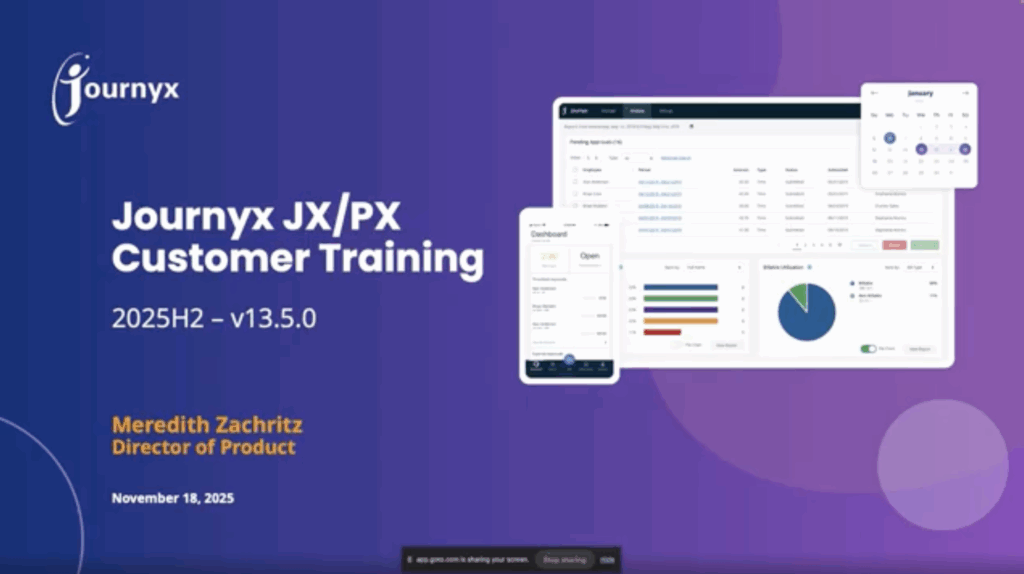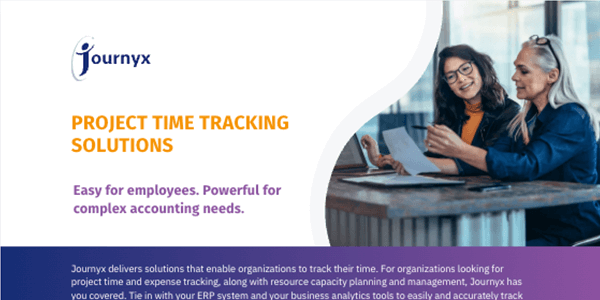Reflections on Managing a Remote Workforce
Lessons learned managing remote teams for over 15 years: what works, and what doesn’t.
 Written by Lance Ellisor, Chief Operations Officer, Journyx, Inc.
Written by Lance Ellisor, Chief Operations Officer, Journyx, Inc.
I’ve been in management for almost 30 years and have managed remote teams for over half of that time. In March 2020 (I assume that date rings a bell), along with the rest of the world, our CEO and I took Journyx fully remote, and we’ve never gone back. Operating a remote-only company has been so successful that we shut down our office for good when the lease ended. Frankly, it’s been a competitive advantage for us in several ways, not least of which is being able to hire talent from anywhere.
Over these years, I’ve learned a lot—and I continue to learn—about what works and doesn’t work. I thought hard about what the keys to success have been, and here’s what I came up with:
- Outcome-based performance management
- Singular focus on a tangible, shared goal
- Wild celebration of success and meaningful rewards
- Presumption of professional responsibility
Outcome-based performance management
The most important success factor, bar none, is an outcome-based performance management approach. This means establishing complete clarity, mutually with the team, as to what the required outcomes are; instrumenting to ensure that performance versus the outcomes is tracked fairly, accurately, and easily; and, critically, ensuring that success is rewarded and that failure comes with accountability.
Here’s my blunt view: if your emotional reaction about remote work is “I don’t trust my employees to work when at home” or your instinct is to ask your IT team to install activity tracking software on employee laptops to make sure your employees are moving their mouse and typing frequently, then I would argue that you’ve already failed in your role as an executive — even in an in-person only environment. If you have to rely on floor supervisors, cameras, or tracking software to ensure your workforce “stays busy,” then you’ve already lost; you’re neither staffed nor operating in a way to meet your organization’s real needs.
Your employees’ jobs are not to “stay busy;” their job is to produce meaningful business outcomes.
It’s not always easy to identify what these outcomes are—much less how to track on them—for the kinds of teams that can work remotely (knowledge workers), but that’s why they pay us executives the big bucks.
I will write much more about outcome-based performance management—including how to quantify knowledge work (function by function)—in a focused piece I’ll publish later. But for now, I assert that it’s your (and your leadership team’s) job to create clarity about what corporate metrics matter most and how each function contributes to one or more of the metrics. At that point, it’s your leadership team’s responsibility to decompose their respective teams’ contributions into meaningful “ground level” metrics and objectives that they can track on as a team, and to work with the management on their own teams to do so again all the way down to the individual contributor level.
When your employees understand not only what they’re measured on but how it contributes to the company’s key goals, then you are positioned to effect outcome-based performance management, and you can stop worrying about who’s at their desk or how many keystrokes they’re making.
Singular focus on a tangible, shared goal
In his seminal work, The Advantage, author Patrick Lencioni proposes that to promote the health of the organization, the leadership team should first create clarity (a set of truths about the organization, its situation, its goals, etc), and then “overcommunicate” this clarity to the team. A key part of that clarity is what he calls “The Thematic Goal” or the “Rally Cry, “an answer to the question “What’s most important right now?”
In my experience, remote teams are most successful when they have absolute clarity about the goal and how their work relates to it. This only works when the goal is truly concrete and represents an achievable endpoint that is well-defined and understood by all. It can’t be something ongoing like “staying profitable” or mealy-mouthed like “returning shareholder value.” Rather, the team’s goal needs to be something that can be clearly achieved in a binary way (“Yes, we did it.”), actually achievable, and be something meaningful enough as to be worthy of celebration (see below).
In the early 2010s, I led a mostly remote team to the goal of launching a consumer software product in partnership with a massive consumer brand. We had less than 4 months to create something essentially from nothing. The clarity of the goal and the urgency of the deadline sharpened our senses as a team and gave every single team member a sense of purpose, along with mutual reliance on and responsibility to the other members of the team. I never had to ask anyone to prove to me they were working hard; they had to because each person had assignments that the team depended on. Looking back, what we achieved in that time feels nearly miraculous. But I am convinced that almost any team of solid professionals could’ve done it; the critical success factor was the clarity of focus on a tangible, shared goal.
Wild celebration of success and meaningful rewards
In the early 2000s, I led a team that delivered the successful implementation of what was then the largest customer the company had ever had. I organized a celebration down at the river, where I brought a cooler of beer and made bratwurst wraps (we use tortillas here in Texas). Multiple folks on the team came up to me during and after the party to say they’d never been recognized like this before. While that team was not remote, the experience had an impact on me: I’d only spent maybe $75 on the food and beverages for a group of a dozen or so people, but it was meaningful to them. So, I carried this practice forward in my career, to other goals and other teams, most of which were at least partially remote.
When the consumer product I mentioned above went live successfully, I flew the team into Austin, and we all went to a screening of The Social Network at Alamo Drafthouse, followed by a happy hour at a nearby bar and grill. The travel expenses were not trivial, but the celebration costs were marginal. The feedback from the team was overwhelmingly positive, and the team went on to deliver other successes thereafter, energized by the recognition and camaraderie.
Celebrations truly are key, but alone they are not enough. I’ve also found that when individuals or teams deliver repeated success, it’s important to respond with meaningful rewards. At another company, our VP of Sales promised an iPad 2 mini to every employee if we met a certain goal (takeaways from a competitor). The entire company-some 120+ people scattered around the US—rallied around the cause, helping in every way they could. In the end, the goal was reached, and everyone got the reward (or an equivalent). Personally, I favor monetary rewards (spot bonuses), and as with the iPads, I think it’s worth letting the team know about the reward in advance.
You may be thinking,”Flights? Celebrations? Bonuses? That’s a lot of money.” Certainly. However, I’d argue that the payoff is absolutely there in terms of meeting your goals and creating a common sense of purpose and stronger relationships. It’s about engendering trust: as a leader, you are going to show them in an authentic way that their contribution truly matters.
Presumption of professional responsibility
“Work is work. You don’t show up late, you don’t make excuses, and you don’t not work. If it wasn’t work, they wouldn’t call it work. They’d call it super, wonderful, crazy fun time. Or skippity-doo.” — Red Forman, That 70s Show
In my view, remote work is a two-way bargain: employees get all the benefits of working out of their own home, and in exchange the expectation is that they’ll actually hold up their end by delivering value to the organization who pays them. The facilitator of an executive leadership program I completed declared that she assumed all the students were “fully functional adults.” I call it a presumption of professional responsibility.
The responsibility is not just to achieve one’s individual results (which are easy to track and matter the most), but also to share in the responsibility of team results, which means signing up for more work when they recognize they’re underutilized. Obviously you can’t force or enforce this; rather, it comes from a balance of good management (trust, communication, connection) and good team members. And that brings me to my next point…
A critical success factor in being able to presume professional responsibility is that you hire well. In your recruiting and interview process, look for individuals who’ve demonstrated integrity. They don’t necessarily have to be motivated by some higher purpose; it’s okay if money is their thing. But they must be demonstrably committed to a principle of fairness, to putting honest effort into their assignments because they’re being fairly compensated for it, and trusted to speak up when they can do more.
Finally, just as I’ve found that celebrating and rewarding success from remote teams yields even more success, I’ve also found that it’s equally vital to hold individuals and teams accountable, particularly when there have been repeated shortcomings. It’s never personal, and if you’ve done your job right, it’s never a surprise. It is fundamentally fair for the organization to expect the results agreed to up front. Taking the appropriate action—whether remedial or outright replacement— makes the organization stronger.
Again, in my experience, the most important success factor for remote teams, bar none, is an outcome-based performance management approach. This means:
- establishing complete mutual clarity with the team as to what the required outcomes are;
- instrumenting to ensure that performance versus the outcomes is tracked fairly, accurately, and easily;
- establishing a single, clear, shared goal; celebrating and rewarding success;
- and that making sure that repeated failure comes with accountability.
For more information, check out our Executive’s Guide to Making Remote Work REALLY Work for Your Business, which includes a ton of data and citations from trusted resources.
Looking for time tracking (project time tracking or time and attendance) for your organization? We’d be honored to help you find the right solution. Contact us today!
Let’s Get Started. Book a Demo Today.
Journyx helps you track time for projects, payroll, and more. Learn how Journyx can help you use time to your advantage in your business.



